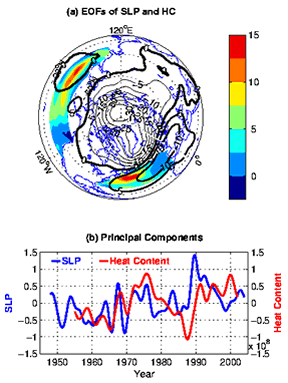Air-Sea Fluxes and Ocean Heat Content in the Western Boundary Current
by Kathryn Kelly
Kathie's current research interests include understanding atmosphere-ocean coupling in the mid-latitudes, the upper ocean heat budget and the effect of the ocean on air-sea heat fluxes and on extra-tropical storms, and decadal variability in all of these areas. Satellite observations, with large-scale coverage and high resolution, allow a close look at the relatively narrow current systems, as well as revealing a wealth of detail about coupling processes. This detailed view is combined with the coarser view from longer data records and with numerical circulation models to understand the processes responsible for observed phenomena and to extrapolate observed interannual-to-decadal variations to the decadal time scales.
Altimetric Derived Estimates of the North Atlantic Upper Ocean Heat Budget
The goals of this work are to compute and interpret the upper ocean heat budget in terms of ocean circulation changes and ocean heat storage, and to understand both fluxes of heat across the current systems and fluxes between the atmosphere and the ocean. Comparisons are made between heat budgets derived from a simple model using the altimeter data for geostrophic velocities and from a high-resolution ocean general circulation model
The Impact of Ocean Current Systems on the Atmosphere
This is a regional study of the impact of midlatitude western boundary currents on the atmosphere, specifically on the evolution of storms and their tracks over the Gulf Stream. Analyses and statistics from scatterometer wind fields, as well as fields from weather prediction products, will be compared with ocean parameters: sea surface temperature (SST), heat content, and air-sea fluxes to determine significant connections, with particular emphasis on the prediction of storm statistics. Experiments using an atmospheric GCM will be used to understand the processes responsible for observed atmosphere-ocean interactions.
CLIvar Mode Water Dynamic Experiment
CLIMODE is a multi-institutional field experiment to study the dynamics of the subtropical mode water of the North Atlantic. This unstratified water mass, formed adjacent to the Gulf Stream in a region of substantial ocean heat loss, has a large capacity for heat storage. CLIMODE examines key processes of mode water formation that are poorly understood and poorly represented in ocean climate models: convection, eddy and mixing processes, the associated air-sea interaction, and the exchange of fluid between the mixed layer and the upper ocean.

